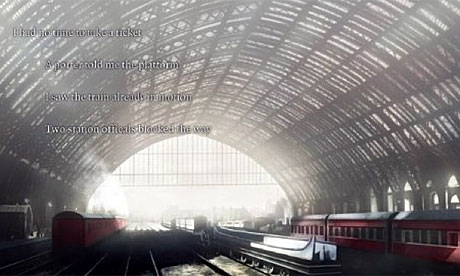Faber trails 'fully immersive' version of The Thirty-Nine Steps, and a bespoke ebook using digital format to rethink conventional narrative
Setting off for a new kind of book ... an image from Faber's digital Thirty-Nine Steps
Fiction edged its way closer to a digital incarnation with the publication this week of an interactive visual version of John Buchan's classic thriller, The Thirty-Nine Steps.
Publisher Faber&Faber announced that it had up with two software publishers and a developer, The Story Mechanics, to create a "fully playable, fully immersive product" which it believes breask new ground in digital reading.
It said the app includes classic stop-frame animation and original silent film music. It would allow readers to "unlock dozens of achievements and items to collect on their reading journey, and explore hundreds of hand-painted digital environments and context from 1910s Britain."
Published originally as a serial in Blackwoods magazine in 1915, The Thirty-Nine Steps was the first of five novels to feature the 20th century's earliest and most famous action hero, Richard Hannay, a man constantly on the run.
Buchan described the novel as a "shocker" – an adventure so unlikely that the reader is only just able to believe that it could really have happened. A number of film and TV adaptations, beginning with Alfred Hitchcock's 1935 version, have taken the book beyond the printed page, but Faber promises another step beyond Buchan's original storytelling.
Henry Volans, head of Faber Digital, said: "The Story Mechanics have come up with something completely new in the landscape of fiction ebooks. It's a new way of reading with John Buchan's story at its heart, presented afresh through a TV and gaming-inspired lens." The Thirty-nine Steps will be available for iPad, Mac, and Android tablets.
Faber also took advantage of this week's London Book Fair to introduce another innovative piece of fiction, Arcadia, by Iain Pears – which will be published in digital form in the autumn, with a book following next year.
Demonstrating the structure to publishers, Pears explained that the novel was inspired by quantum physics, and written in "nodes" which had been mapped on to a graph constructed after consultation with an Oxford mathematics professor.
The aim was to create an infinite number of ways in which the story could be read – though Pears emphasised that Arcadia was not an interactive novel. "I'm still in charge of the story because I'm arrogant enough to feel that I'm a better story-teller," he said.
One result of its format, he said, was to get the story beyond the constraints of time. "It also gets rid of causality. I use the analogy of dropping a cup and causing it to break. It's also possible that the cup breaking causes you to drop it."
The novel is being constructed in partnership with a software developer and a digital designer and will be rewritten for the print version, which will be "like the director's cut", said Pears.
Volans said: "Too often publishers ask themselves how they can bolt something on to a finished novel, like retro-fitting a car. This is posing a much more profound challenge: it's a novel in conceived form written on bespoke software."
It said the app includes classic stop-frame animation and original silent film music. It would allow readers to "unlock dozens of achievements and items to collect on their reading journey, and explore hundreds of hand-painted digital environments and context from 1910s Britain."
Published originally as a serial in Blackwoods magazine in 1915, The Thirty-Nine Steps was the first of five novels to feature the 20th century's earliest and most famous action hero, Richard Hannay, a man constantly on the run.
Buchan described the novel as a "shocker" – an adventure so unlikely that the reader is only just able to believe that it could really have happened. A number of film and TV adaptations, beginning with Alfred Hitchcock's 1935 version, have taken the book beyond the printed page, but Faber promises another step beyond Buchan's original storytelling.
Henry Volans, head of Faber Digital, said: "The Story Mechanics have come up with something completely new in the landscape of fiction ebooks. It's a new way of reading with John Buchan's story at its heart, presented afresh through a TV and gaming-inspired lens." The Thirty-nine Steps will be available for iPad, Mac, and Android tablets.
Faber also took advantage of this week's London Book Fair to introduce another innovative piece of fiction, Arcadia, by Iain Pears – which will be published in digital form in the autumn, with a book following next year.
Demonstrating the structure to publishers, Pears explained that the novel was inspired by quantum physics, and written in "nodes" which had been mapped on to a graph constructed after consultation with an Oxford mathematics professor.
The aim was to create an infinite number of ways in which the story could be read – though Pears emphasised that Arcadia was not an interactive novel. "I'm still in charge of the story because I'm arrogant enough to feel that I'm a better story-teller," he said.
One result of its format, he said, was to get the story beyond the constraints of time. "It also gets rid of causality. I use the analogy of dropping a cup and causing it to break. It's also possible that the cup breaking causes you to drop it."
The novel is being constructed in partnership with a software developer and a digital designer and will be rewritten for the print version, which will be "like the director's cut", said Pears.
Volans said: "Too often publishers ask themselves how they can bolt something on to a finished novel, like retro-fitting a car. This is posing a much more profound challenge: it's a novel in conceived form written on bespoke software."

No comments:
Post a Comment